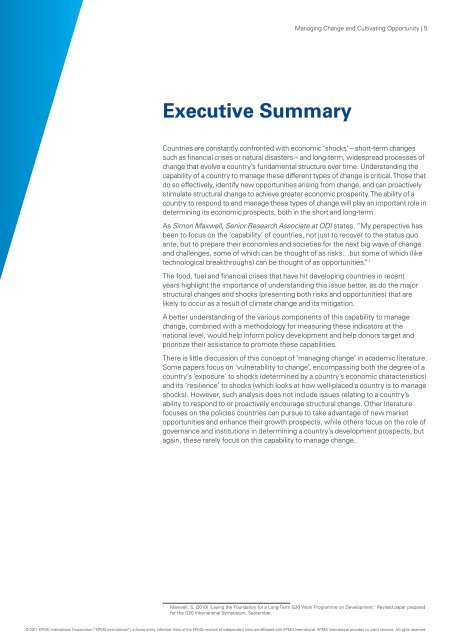Managing change and cultivating opportunity (PDF 1.66 MB) - KPMG
Managing change and cultivating opportunity (PDF 1.66 MB) - KPMG
Managing change and cultivating opportunity (PDF 1.66 MB) - KPMG
You also want an ePaper? Increase the reach of your titles
YUMPU automatically turns print PDFs into web optimized ePapers that Google loves.
<strong>Managing</strong> Change <strong>and</strong> Cultivating Opportunity | 5<br />
Executive Summary<br />
Countries are constantly confronted with economic ‘shocks’ – short-term <strong>change</strong>s<br />
such as financial crises or natural disasters – <strong>and</strong> long-term, widespread processes of<br />
<strong>change</strong> that evolve a country’s fundamental structure over time. Underst<strong>and</strong>ing the<br />
capability of a country to manage these different types of <strong>change</strong> is critical. Those that<br />
do so effectively, identify new opportunities arising from <strong>change</strong>, <strong>and</strong> can proactively<br />
stimulate structural <strong>change</strong> to achieve greater economic prosperity. The ability of a<br />
country to respond to <strong>and</strong> manage these types of <strong>change</strong> will play an important role in<br />
determining its economic prospects, both in the short <strong>and</strong> long-term.<br />
As Simon Maxwell, Senior Research Associate at ODI states, “My perspective has<br />
been to focus on the ‘capability’ of countries, not just to recover to the status quo<br />
ante, but to prepare their economies <strong>and</strong> societies for the next big wave of <strong>change</strong><br />
<strong>and</strong> challenges, some of which can be thought of as risks…but some of which (like<br />
technological breakthroughs) can be thought of as opportunities.” 1<br />
The food, fuel <strong>and</strong> financial crises that have hit developing countries in recent<br />
years highlight the importance of underst<strong>and</strong>ing this issue better, as do the major<br />
structural <strong>change</strong>s <strong>and</strong> shocks (presenting both risks <strong>and</strong> opportunities) that are<br />
likely to occur as a result of climate <strong>change</strong> <strong>and</strong> its mitigation.<br />
A better underst<strong>and</strong>ing of the various components of this capability to manage<br />
<strong>change</strong>, combined with a methodology for measuring these indicators at the<br />
national level, would help inform policy development <strong>and</strong> help donors target <strong>and</strong><br />
prioritize their assistance to promote these capabilities.<br />
There is little discussion of this concept of ‘managing <strong>change</strong>’ in academic literature.<br />
Some papers focus on ‘vulnerability to <strong>change</strong>’, encompassing both the degree of a<br />
country’s ‘exposure’ to shocks (determined by a country’s economic characteristics)<br />
<strong>and</strong> its ‘resilience’ to shocks (which looks at how well-placed a country is to manage<br />
shocks). However, such analysis does not include issues relating to a country’s<br />
ability to respond to or proactively encourage structural <strong>change</strong>. Other literature<br />
focuses on the policies countries can pursue to take advantage of new market<br />
opportunities <strong>and</strong> enhance their growth prospects, while others focus on the role of<br />
governance <strong>and</strong> institutions in determining a country’s development prospects, but<br />
again, these rarely focus on this capability to manage <strong>change</strong>.<br />
1<br />
Maxwell, S. (2010) ‘Laying the Foundation for a Long-Term G20 Work Programme on Development.’ Revised paper prepared<br />
for the G20 International Symposium, September.<br />
© 2011 <strong>KPMG</strong> International Cooperative (“<strong>KPMG</strong> International”), a Swiss entity. Member firms of the <strong>KPMG</strong> network of independent firms are affiliated with <strong>KPMG</strong> International. <strong>KPMG</strong> International provides no client services. All rights reserved.
















